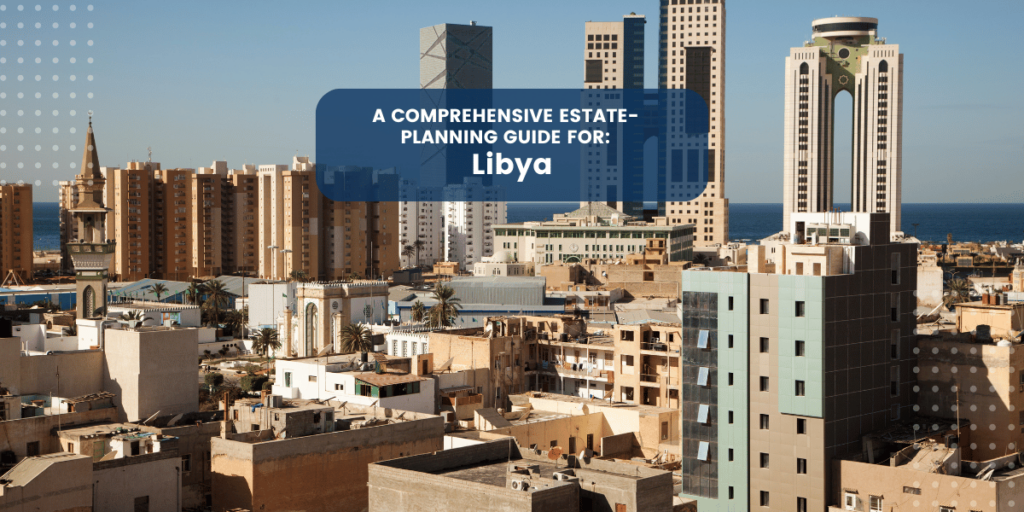Estate Planning in Libya: A Comprehensive Guide to Safeguarding Your Legacy
Introduction
Libya, with its breathtaking Mediterranean coastline, ancient ruins, and rich cultural heritage, holds a unique place in North Africa. Despite political challenges, Libya remains a country of immense historical and economic significance. Navigating estate planning in Libya, however, can be complex due to specific inheritance laws, religious influences, and the evolving legal landscape.
This guide explores the intricacies of estate planning in Libya, highlights the importance of securing your legacy, and shows how tools like the Wills App provide global solutions for secure storage and automated distribution of essential documents.
Overview of Estate Planning in Libya
Inheritance Laws
Libya’s inheritance laws are heavily influenced by Islamic principles, particularly Sharia law. These laws emphasize a fixed distribution of assets among heirs, prioritizing immediate family members.
- Male Heirs: Generally receive double the share of female heirs.
- Primary Heirs: Parents, spouses, and children are prioritized, though extended family may also inherit depending on circumstances.
- Non-Muslims: Residents or foreigners may face additional complexities when planning estates.
For more details, consult Libya’s Law on Personal Status.
Standard Estate Planning Documents
- Wills (وصية): Islamic wills can only distribute up to one-third of an estate outside of Sharia-prescribed shares.
- Power of Attorney (وكالة): Grants authority to manage finances or legal matters.
- Trust Agreements: Though rare, these are used for asset management under specific circumstances.
- Advance Healthcare Directives: Still uncommon but gaining recognition.
Creating a Will or Equivalent Estate Plan in Libya
Required Documentation
- Personal identification documents (passport or national ID).
- A clear declaration of assets and beneficiaries.
- Witness statements (minimum of two witnesses).
- Marriage and birth certificates (if applicable).
Legal Requirements
- Wills must comply with Sharia law unless specified otherwise for non-Muslim residents.
- Two witnesses are required, and they cannot be beneficiaries.
- Wills must be notarized for legal validity.
Step-by-Step Guide
- Identify Assets and Heirs: Prepare an inventory of your assets and list potential heirs.
- Consult a Legal Expert: Seek advice to ensure compliance with Libyan laws.
- Draft the Will: Include detailed instructions for asset distribution.
- Notarize the Will: Validate the document through a certified notary.
- Store the Will: Use the Wills App for secure digital storage and global accessibility.
Navigating Local Challenges in Estate Planning
Cultural and Legal Barriers
Estate planning in Libya faces several challenges, including:
- Fixed inheritance shares under Sharia law may limit individual discretion.
- Political instability can affect access to legal resources.
- Women may face challenges when claiming inheritance rights.
The Wills App provides a secure platform to store and distribute your estate documents, ensuring your wishes are respected regardless of local challenges.
Unique Aspects of Estate Planning in Libya
- Guardianship Regulations: Typically assigned to the closest male relative; women may require legal processes to claim guardianship rights.
- Pet Guardianship: Rare in Libyan estate planning but possible for expatriates.
- Cross-Border Considerations: Foreigners with assets in Libya must navigate local laws alongside their home country’s regulations.
Using the Wills App to Secure Your Legacy
Features
- Secure Storage: Encrypt and safely store wills, title deeds, and key documents.
- Inactivity Timer: Automates document delivery upon user inactivity.
- Automated Distribution: Schedule personalized messages, videos, and financial transfers to loved ones.
Step-by-Step Usage
- Upload essential documents.
- Set inactivity triggers and specify recipients.
- Schedule personalized messages or mementos.
Ethical Will and Memory Preservation
Concept of Ethical Wills
An ethical will allows individuals to pass on values, traditions, and life lessons, offering a heartfelt way to preserve their legacy beyond material assets.
How the Wills App Supports This
- Record videos sharing your values.
- Write letters to your family and future generations.
- Schedule delivery of these non-material legacies through the app.
Key Estate Planning Tips for Libya
- Understand Sharia law to ensure compliance with inheritance regulations.
- Plan for guardianship and specify guardians for minors in your will.
- Consult legal experts to navigate complex legal frameworks.
- Store documents securely using the Wills App.
- Address cross-border issues by coordinating with legal professionals in multiple jurisdictions.
Frequently Asked Questions (FAQs)
1. What is the role of Sharia law in Libyan inheritance?
Sharia law governs inheritance in Libya, mandating fixed asset shares among heirs.
2. Can expatriates create wills in Libya?
Yes, but they must comply with local laws or international treaties.
3. How can I store my will securely?
Use the Wills App to encrypt and store your documents digitally.
4. Are women entitled to inheritance under Libyan law?
Yes, but they typically receive half the share of male heirs.
5. What taxes apply to inheritance in Libya?
Libya does not currently impose inheritance taxes.
6. How is guardianship decided for minors?
Guardianship is usually assigned to a close male relative under Sharia law.
7. Can I include pets in my will?
While uncommon, expatriates may address pet care informally.
8. What happens to my assets if I don’t have a will?
Assets are distributed according to Sharia inheritance laws.
9. Is notarization required for wills in Libya?
Yes, notarization is essential for legal validity.
10. Can the Wills App help with cross-border estate planning?
Yes, the app provides global storage and automated document delivery.
Disclaimer
Have more questions? Explore additional topics in our Learning Center or connect with our customer support team through our Contact page. Wills.com provides easy-to-use legal forms and resources for estate planning. Please note that we are not a law firm and do not offer legal advice. The details in this article may be subject to change as laws, customs, and regulations evolve.



